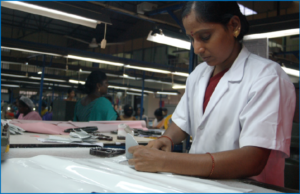



How skill development can enhance productivity in the leather sector Author: K. Ramachandran, LSSC
 Leather industry has been facing shortage of skilled manpower for various job roles. Particularly at the shop floor level, approximately for 85% of the workforce are either unskilled or semi-skilled. They enter into the industry without formal training and continue to learn on the job, often acquiring few skills to carry out basic roles like in Footwear and Goods and Garments segments. Since they are not formally trained in various skills, their output is below standards and it impacts quality of the product and business results.
Leather industry has been facing shortage of skilled manpower for various job roles. Particularly at the shop floor level, approximately for 85% of the workforce are either unskilled or semi-skilled. They enter into the industry without formal training and continue to learn on the job, often acquiring few skills to carry out basic roles like in Footwear and Goods and Garments segments. Since they are not formally trained in various skills, their output is below standards and it impacts quality of the product and business results.
Today, many employers are aware of the issues connected with lack of productivity and they are ready to address it by skilling their workforce. This is great positive sign for the growth of the industry that has a huge potential for export revenues from global market. It also has huge scope to generate employment, both in urban and rural areas. LSSC has been actively involved in skilling the workforce in the leather sector through curriculum design (Qualification Packs – Qps), National Occupational Standards (NOS) aligned with many job roles in the industry, as per National Skills Qualification Framework (NSQF). This has been of prime importance in developing and implementing a curriculum that meets the demands for right skills in the industry by facilitating training programs.
Another aspect of productivity is related to re-skilling the existing workforce. We have seen that over the years many employees would use skills and knowledge that is outdated or inappropriate. Their productivity suffers and they need to unlearn old way of doing things and re-learn new technology and new skills. Hence, re-skilling is critical parameter in gauging the productivity and measuring the outcomes. This will help in enhancing the quality of output by reducing wastage, thereby bringing in process efficiency.
 When it comes to use of technology in designing and producing leather footwear, goods and garments, today many companies are opting for automating routine jobs. However, since leather needs a lot of manual talent and skill, there will always be a need for honing the skills like stitching and skiving. Operating latest machines requires learning new ways to do the job without causing delays or snags in the production line.
When it comes to use of technology in designing and producing leather footwear, goods and garments, today many companies are opting for automating routine jobs. However, since leather needs a lot of manual talent and skill, there will always be a need for honing the skills like stitching and skiving. Operating latest machines requires learning new ways to do the job without causing delays or snags in the production line.
Productivity is also linked with recognizing the existing skills of the workforce. This refers to skills and knowledge acquired informally on their own, or on-the-job by learning from peers and superiors. The employees feel acknowledged when they are certified on what they already know and perform better. It is here that initiatives like Recognition of Prior Learning (RPL) and RPL – Best in Class Employer has helped many in the leather industry to get certified and further improve their skills and develop a career.
Skill development has a critical role to play in enhancing employee productivity and keeping them equipped with latest knowledge. It is essential that all companies implement their plans to skill their employees in the right way by following the QP, NOS and align their training to NSQF. By improving productivity they can achieve better business results and face the competition at the global level.